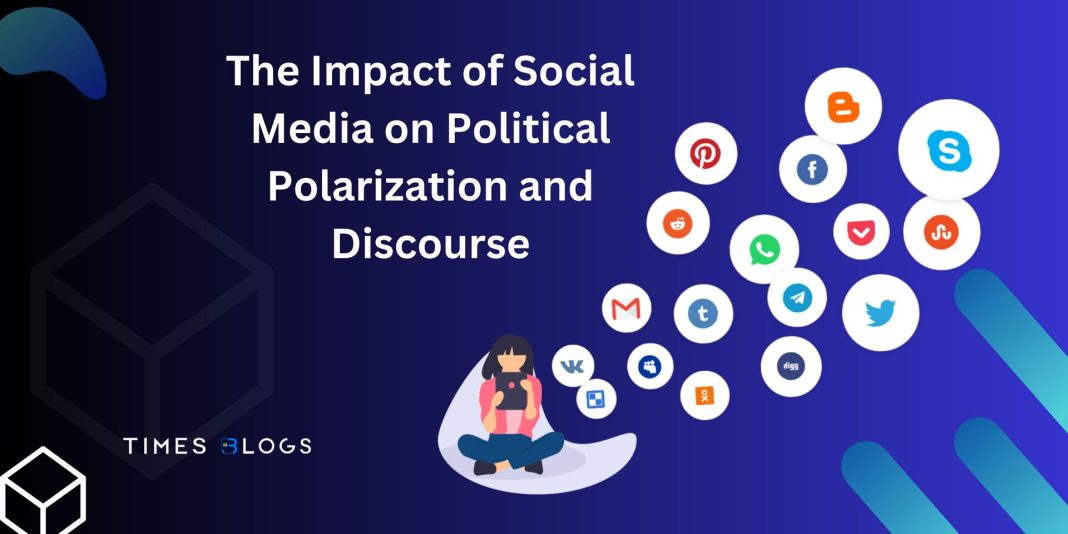Introduction
Social media platforms have become a ubiquitous part of our lives in the 21st century. They allow us to connect with people across the globe, access information, and stay informed about the latest news and trends. However, as these platforms have become more popular, concerns have emerged about the impact they have on political discourse and polarization. In this blog post, we will explore the impact of social media on political polarization and discourse. We will provide examples of how social media has affected political discourse and polarization in various countries around the world.
What is Political Polarization?
Political polarization refers to the increasing divide between different political groups in a society. This divide can be based on various factors, including political ideology, religion, race, or socioeconomic status. Political polarization can lead to a breakdown in civil discourse, as people become more entrenched in their own beliefs and less willing to listen to opposing viewpoints.
How has Social Media Contributed to Political Polarization?
The rise of social media has contributed to political polarization in several ways. First, social media platforms allow people to self-select the information they consume. Users can choose to follow accounts and pages that align with their beliefs and values, and ignore those that don’t. This creates what has been called an “echo chamber,” where people are exposed only to viewpoints that reinforce their own beliefs.
For example, in the United States, political polarization has increased in recent years, with Democrats and Republicans becoming increasingly divided. Social media has played a role in this polarization by allowing users to consume news and information from sources that align with their political beliefs. A study by the Pew Research Center found that people who identified as conservatives were more likely to consume news from conservative media outlets, such as Fox News, and liberals were more likely to consume news from liberal outlets, such as CNN.
Second, social media platforms have made it easier for people to connect with like-minded individuals, and to organize around shared beliefs and values. This has led to the creation of online communities, or “echo chambers,” where people can discuss and reinforce their political beliefs without being challenged by opposing viewpoints.
For example, in India, social media has played a role in the rise of Hindu nationalism, a political movement that seeks to promote the interests of Hindus in India. Supporters of Hindu nationalism have used social media to spread their message, organize rallies and protests, and connect with like-minded individuals. This has led to a polarization of Indian society, with Hindus and non-Hindus becoming increasingly divided.
Third, social media platforms have made it easier for politicians and political parties to target their messages to specific groups of voters. By using data analytics and micro-targeting, political parties can create messages that appeal to specific groups of voters, based on their age, gender, location, and other demographic factors.
For example, in the United States, the Trump campaign used micro-targeting to reach specific groups of voters, such as suburban women or rural voters. The campaign used Facebook to target these voters with ads that were tailored to their interests and concerns. This allowed the Trump campaign to effectively reach these voters, and potentially influence their voting behavior.
Fourth, social media platforms have made it easier for fake news and misinformation to spread. Social media users can easily share news stories and information without fact-checking or verifying the accuracy of the information. This has led to the spread of fake news and misinformation, which can further polarize political discourse.
For example, during the 2016 U.S. presidential election, fake news stories were widely shared on social media. These stories often reinforced existing biases and beliefs and may have influenced some voters’ decisions. One widely shared fake news story claimed that Pope Francis had endorsed Donald Trump for president. The story was completely false, but it was shared thousands of times on social media.
The Impact of Social Media on Political Discourse
In addition to contributing to political polarization, social media has also had a significant impact on political discourse. Political discourse refers to the discussion and exchange of ideas and opinions related to politics.
Social media has made it easier for people to engage in political discourse, by providing a platform for people to express their opinions and engage with others. Social media has also made it easier for people to access news and information related to politics, allowing them to stay informed and participate in political discourse.
However, social media has also had negative impacts on political discourse. The echo chamber effect, where people are only exposed to viewpoints that reinforce their own beliefs, can lead to a breakdown in civil discourse. People may become less willing to listen to opposing viewpoints, and more likely to engage in personal attacks and insults.
For example, in the United States, political discourse on social media has become increasingly polarized and divisive. Social media platforms have been used to spread misinformation and conspiracy theories, and to attack political opponents. This has led to a breakdown in civil discourse, with people becoming more entrenched in their own beliefs and less willing to listen to opposing viewpoints.
Similarly, in Brazil, social media has been used to spread disinformation and attack political opponents. During the 2018 presidential election, supporters of Jair Bolsonaro, the eventual winner, used social media to spread fake news and conspiracy theories about his opponent, Fernando Haddad. This led to a breakdown in civil discourse, with supporters of Bolsonaro becoming more entrenched in their beliefs and less willing to engage in civil discourse.
How Can We Address the Negative Impacts of Social Media on Political Discourse and Polarization?
Given the negative impacts that social media can have on political discourse and polarization, it is important to find ways to address these issues. Here are some potential solutions:
- Promote media literacy: Media literacy refers to the ability to critically analyze and evaluate media messages. By promoting media literacy, we can help people to better understand how social media works, and to identify and resist misinformation and fake news.
- Encourage civil discourse: We can encourage civil discourse by promoting respectful and open communication. This can involve creating spaces for people to engage in respectful dialogue and debate, and encouraging people to listen to opposing viewpoints.
- Regulate social media: Governments can play a role in regulating social media, by setting standards for the accuracy of information and promoting transparency in advertising. This can help to prevent the spread of fake news and misinformation.
- Support fact-checking organizations: Fact-checking organizations play an important role in verifying the accuracy of information and debunking fake news. By supporting fact-checking organizations, we can help to promote accurate and reliable information.
Conclusion
Social media has had a significant impact on political polarization and discourse. While social media has made it easier for people to engage in political discourse and stay informed about politics, it has also contributed to political polarization and the spread of fake news and misinformation. To address these issues, we need to promote media literacy, encourage civil discourse, regulate social media, and support fact-checking organizations. By doing so, we can help to create a more informed and engaged citizenry, and promote a healthier and more robust democracy.




